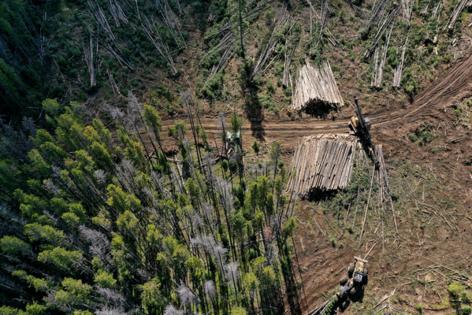Editorial: America's wilderness is priceless
Published in Science & Technology News
One of the traits that makes America great is its wilderness. The Trump administration is moving to open to extraction and development tens of millions of acres of forests now protected by a federal regulation known as the Roadless Rule.
In officially designated roadless areas, no new human infrastructure is permitted, except for conservation and public safety matters, such as wildfire prevention. (In those cases where roads already exist in newly designated wilderness, maintenance is permitted.)
This effectively holds these regions off-limits to logging, mining and other extractive industries. The rule applies to 58.5 million acres of American wilderness. Most of the nearly 200 million acres supervised by the Forest Service is available to industry in some way.
The Roadless Rule is a case study in participatory democracy. When the Clinton administration codified the rule, which went into effect in early 2001, an astounding 1.6 million Americans submitted comments to regulators.
While the vast majority of roadless areas are in the West, Pennsylvania also benefits: About 5% of the Allegheny National Forest, 25,000 acres, is designated roadless by the Department of Agriculture and its subsidiary, the Forest Service, according to the PennEnvironment Research & Policy Center. Those areas, many of which hold some of the last remaining old growth tree stands in northern Appalachia, are regional and national treasures whose loss would be incalculable, no matter what brief economic gain might result.
America has protected this wilderness not just to preserving special and irreplaceable forests. I also ensures that animal habitats, especially those of wide-ranging creatures, is as free as possible from human influence. Perhaps most of all, it's about preserving these places for the enjoyment and benefit of humanity for generations to come.
Few people, if any, walk through an ancient landscape, like the "forest cathedral" of Pennsylvania's Cook Forest State Park, and complain that it wasn't clear-cut a century ago. They give thanks for the foresight the people who held back industry, who insisted that some lands must remain intact. Because of them, in this very commonwealth you can touch a hemlock that first broke through the earth while Michelangelo painted the Sistine Chapel.
The Roadless Rule has always been controversial, with both the George W. Bush and first Trump administrations attempting to weaken it. The rule is a much more potent political issue in the West, where it protects tens of millions of acres many states would like to control and to use to generate tax revenue. Trump's Secretary of Agriculture Brooke Rollins announced plans to rescind the rule at a meeting of the Western Governor's Association.
Western politicians have long complained that because the Roadless Rule lets the USDA secretary create roadless areas, the department create de facto wilderness areas by fiat, while the official "wilderness" designation requires Congress to act. This argument has been rejected by federal courts, but the expansion of roadless areas remains a sore point.
It may be possible to adjust the rule in a manner that would place some limits on this expansion. But, characteristically, thoughtful reform is not what the Trump administration wants: They'd like to rescind the Roadless Rule in its entirety. And that would be a disaster for American wilderness, and thus for Americans as a whole.
Roadless wilderness represents a moral principle: that some things are good in themselves and more important than short-term economic gains, and that among them is our country's responsibility to steward its lands for generations to come. Entirely rescinding the Roadless Rule would deny that principle, and in so doing wound America's distinctiveness, and its greatness.
———
©2025 PG Publishing Co. Visit at post-gazette.com. Distributed by Tribune Content Agency, LLC.







Comments